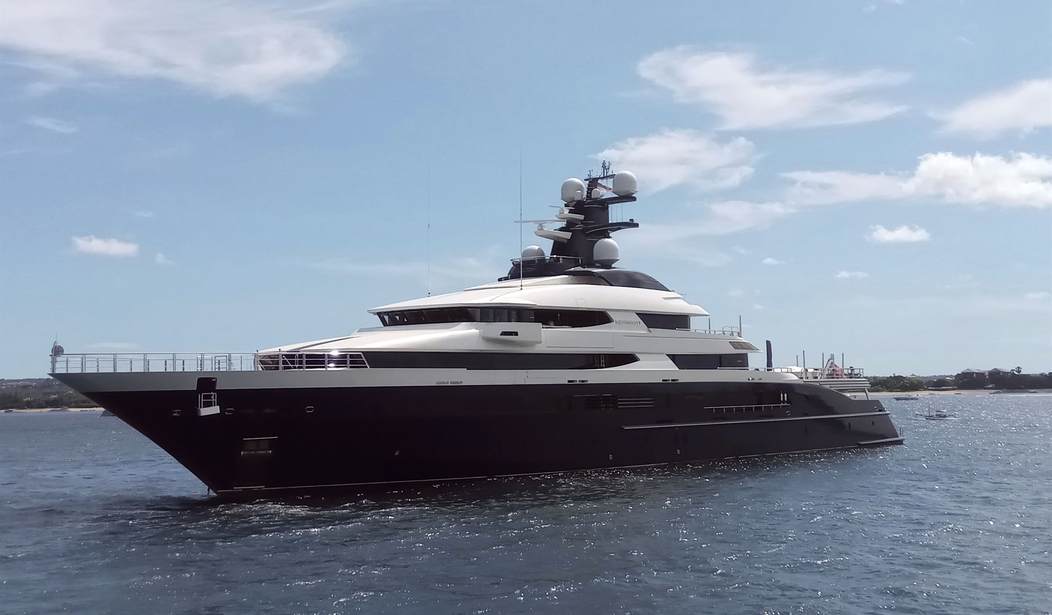By now, we’ve all heard the “feel-good” stories about seizures of property from Russian oligarchs who have long formed the base of Vladimir Putin’s economic and political power structure in Russia. The “superyachts” draw the most attention when they are confiscated, such as those belonging to Alexei Mordashov and Igor Sechin. But private planes and even condominiums and resorts have been confiscated. Joe Biden even bragged about it during his State of the Union address. The motivation behind such moves is obvious and even practical in some ways. If you hit the oligarchs hard enough in the wallet they may start to realize that supporting Putin’s war in Ukraine isn’t such a great idea and potentially abandon him, further isolating the dictator.
But it’s also worth considering that none of this may be legal and we could be setting a very bad precedent. At USA Today, Jonathan Turley points out the uncomfortable reality, suggesting that “it may not be legal” to do this. Frankly, I think invoking the phrase “may not be” falls a bit short. It’s difficult to imagine how this could be legal in terms of the norms of international commerce.
One of the most celebrated moments of President Joe Biden’s State of the Union address came when he spoke directly to Russian oligarchs: “We are joining with our European allies to find and seize your yachts, your luxury apartments, your private jets. We are coming for your ill-begotten gains.”
The Russian oligarch has become a universally despised embodiment of the Putin regime after the Ukrainian invasion. Not surprisingly, the seizure of obscenely opulent yachts – like the 213-foot yacht owned by Alexei Mordashov in Italy and Igor Sechin’s 280-foot yacht in France – has been praised as a victory in defense of democracy. Resorts, planes and other property also have been seized.
To understand what seems to be going on here, it’s important to realize that there is a very large difference between sanctions and seizures. Governments impose sanctions on individuals (as opposed to countries) for a variety of reasons, but they all generally involve barring other entities from doing business with them which could result in the sanctioned individual realizing a profit. Even that concept is a bit dodgy in terms of international business norms, as it creates a situation where one nation’s government can impede the ebb and flow of otherwise legitimate business dealings by issuing a unilateral decree. But at least it’s done through something resembling a normal governmental process.
Even when Elizabeth Warren promised America’s billionaires on the election trail in 2020 that she would be “coming for your Rembrandts, your stock portfolio, your diamonds, and your yachts” (is that sounding familiar yet?), it was generally understood that she was talking about her wealth tax. Granted, the constitutionality of a so-called “wealth tax” is dubious at best. But we unfortunately gave our government nearly unlimited power to levy taxes, so that would still be something different than a direct seizure.
Seizures are something else entirely. This is really little more than the government-sanctioned robbery of property that has been legitimately acquired by the individual, regardless of how shady their methods of acquiring their wealth may have been. This ties into the concerns I previously raised about the world entering into a new era of economic warfare. If massive sanctions are the equivalent of a broadside from your big guns, seizures are a chemical weapons attack.
All of these economic attacks are based on the fact that Vladimir Putin invaded a sovereign nation and his military went on to commit war crimes there. That’s fair enough, and harsh punishment in response is clearly warranted. But it was Putin alone who made that decision and his military carried out the orders. What did the oligarchs actually do in this situation that makes them culpable for the invasion and the war crimes in question?
Imagine for a moment if Joe Biden were as angry about Justin Trudeau’s antidemocratic crackdown on the Freedom Convoys as many other Americans were and he decided to impose sanctions on him. While controversial, it would at least be an explainable response. But would people then be free to show up and start towing away the cars of Trudeau’s relatives living in the United States just for being “associated with” or “supporting of” Trudeau? Would we be able to go the banks where they do business and demand that the tellers give us all of their cash? Should Mark Zuckerberg and Jack Dorsey have their mansions and private jets confiscated without the benefit of a trial for their censorship of free speech on social media? (I know… some of you probably like the sound of that, but let’s be rational here.)
What we’re really doing with these seizures is responding to a war crime with a property crime. And as with everything else in this era of cancel culture and economic warfare, it’s worth remembering that the guns blasting your perceived enemies today could just as easily be aimed at you tomorrow. Nobody wants to see military warfare taking place, but it is sadly one of the ways our species has traditionally resolved disputes where diplomacy fails. And there are ways to impose sanctions and other economic penalties on bad actors in the hopes of modifying their behavior, but we have rules in place as to how such sanctions are imposed and enforced. Simply rushing out and confiscating the property of anyone who gets put on a list of “bad guys” sets a very dangerous precedent.








Join the conversation as a VIP Member